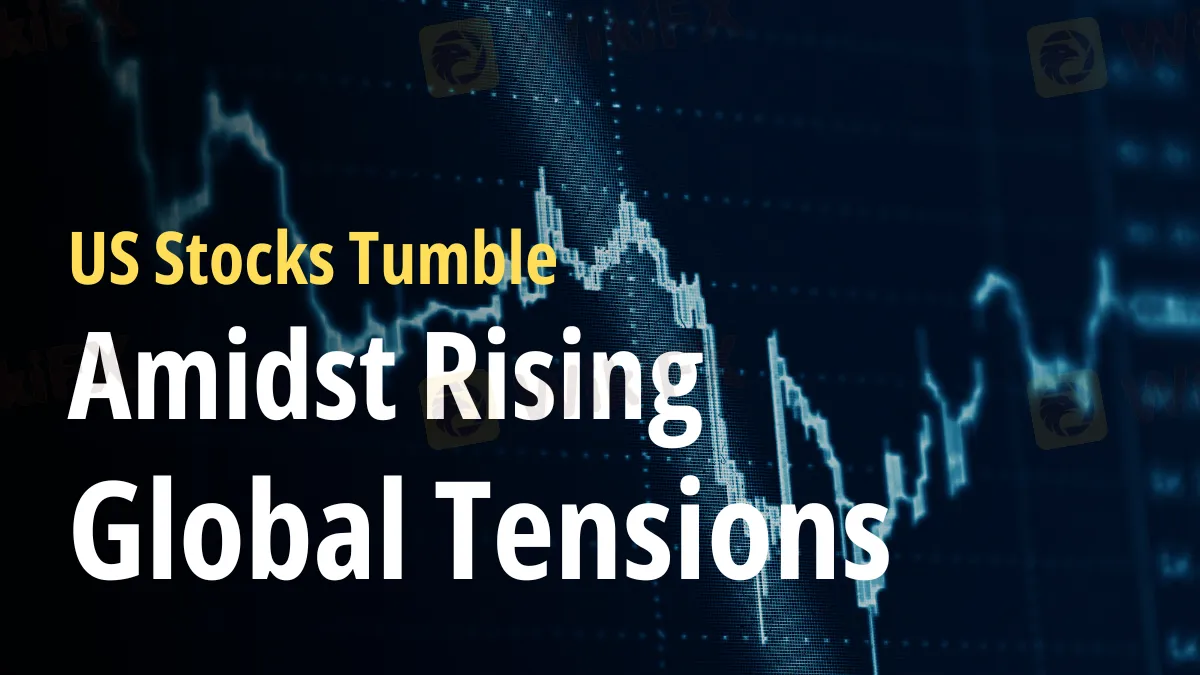简体中文
繁體中文
English
Pусский
日本語
ภาษาไทย
Tiếng Việt
Bahasa Indonesia
Español
हिन्दी
Filippiiniläinen
Français
Deutsch
Português
Türkçe
한국어
العربية
US Stocks Tumble Amidst Rising Global Tensions
Abstract:US stocks decline amid rising tensions between Israel and Iran, causing instability in global markets.

The decrease in the stock market may be attributed to a combination of recent economic statistics and increasing concerns about the escalation of wars in the Middle East, notably in response to Iran's recent military maneuvers. During the weekend, there was a significant escalation of regional tensions as Iran initiated an unparalleled onslaught against Israel. Surprisingly, oil prices saw a fall. Specifically, a barrel of Brent crude ended at $90.10, while a barrel of US WTI dropped to $85.41.
Based on the following response of the stock market, it can be seen that the CNN Fear & Greed Index has transitioned into a condition of “fear” for the first time since November, signifying an increased degree of investor unease. The index, which considers seven separate market attitude indicators, indicates a rise in traders' prudence.

US Treasury rates climbed, exacerbating the market's problems, as retail sales data showed that March saw a rise in consumer expenditure for the second straight month. Despite the Federal Reserve keeping interest rates at a 23-year high, this increase in spending demonstrates the US consumer's continued tenacity. Because of this, there are worries that the Fed may not be able to lower interest rates very soon due to consistently high inflation and a strong economy.
The response was not uniform worldwide. European equities had moderate increases, with the DAX in Germany and the CAC 40 in France both seeing minor increases. On the other hand, the FTSE 100 in London dropped 0.4%. Asia's markets mostly trended down; the Nikkei 225 in Japan and the Hang Seng in Hong Kong both closed at lower levels.
The unpredictability also caused the gold market to respond, with gold futures climbing to almost $2,383 a troy ounce—a 16% rise this year. Investors are shifting towards safer assets as geopolitical and economic upheaval unfolds.
The International Energy Agency, headquartered in Paris, and experts have expressed serious worries about possible interruptions to global oil supplies as a consequence of the current intensification of Middle Eastern wars. The latter emphasized the need to ensure energy security under the current unpredictable circumstances, noting that the occurrences of the preceding weekend had heightened the probability of heightened instability in the oil markets.
The world is now focused on Israel's next action as tensions continue to rise. The magnitude of the threat to international markets and stability may depend critically on Israel's government's reaction after lengthy war cabinet deliberations.
With the potential for further economic consequences based on geopolitical events in the next several days, investors are still wary as they navigate through these difficult times.

Disclaimer:
The views in this article only represent the author's personal views, and do not constitute investment advice on this platform. This platform does not guarantee the accuracy, completeness and timeliness of the information in the article, and will not be liable for any loss caused by the use of or reliance on the information in the article.
Read more

Webull Launches SMSF Investment Platform with Zero Fees
Webull introduces commission-free SMSF trading, offering over 3,500 US and Australian ETFs, with no brokerage fees and enhanced portfolio tools.

Australian Authorities Joins Forces with Philippine Authorities to Combat Cyber Scams
AFP tackles cyber scam boiler rooms in the Philippines, training police to fight fraud and protect Australians from romance and cryptocurrency scams.

How Will the Market React at a Crucial Turning Point?
Safe-haven assets like gold and U.S. Treasuries are surging, while equities face mounting pressure. As this pivotal moment approaches, how will the market react?

Gold Prices Climb Again – Have Investors Seized the Opportunity?
Gold prices have hit record highs for three consecutive days, with a remarkable 19% gain in the first quarter, marking the strongest quarterly performance since 1986. As market risk aversion rises, demand for gold has surged significantly.
WikiFX Broker
Latest News
FCA Warns Against 10 Unlicensed or Clone Firms
CySEC Warns Against 14 Unlicensed Investment Websites
Top Currency Pairs to Watch for Profit This Week - March 31, 2025
Will natural disasters have an impact on the forex market?
Philippines Deports 29 Indonesians Linked to Online Scam Syndicate in Manila
Exposing the Top 5 Scam Brokers of March 2025: A Closer Look by WikiFX
Gold Prices Climb Again – Have Investors Seized the Opportunity?
Webull Launches SMSF Investment Platform with Zero Fees
Australian Regulator Warns of Money Laundering and Fraud Risks in Crypto ATMs
AI-Powered Strategies to Improve Profits in Forex Trading
Currency Calculator







